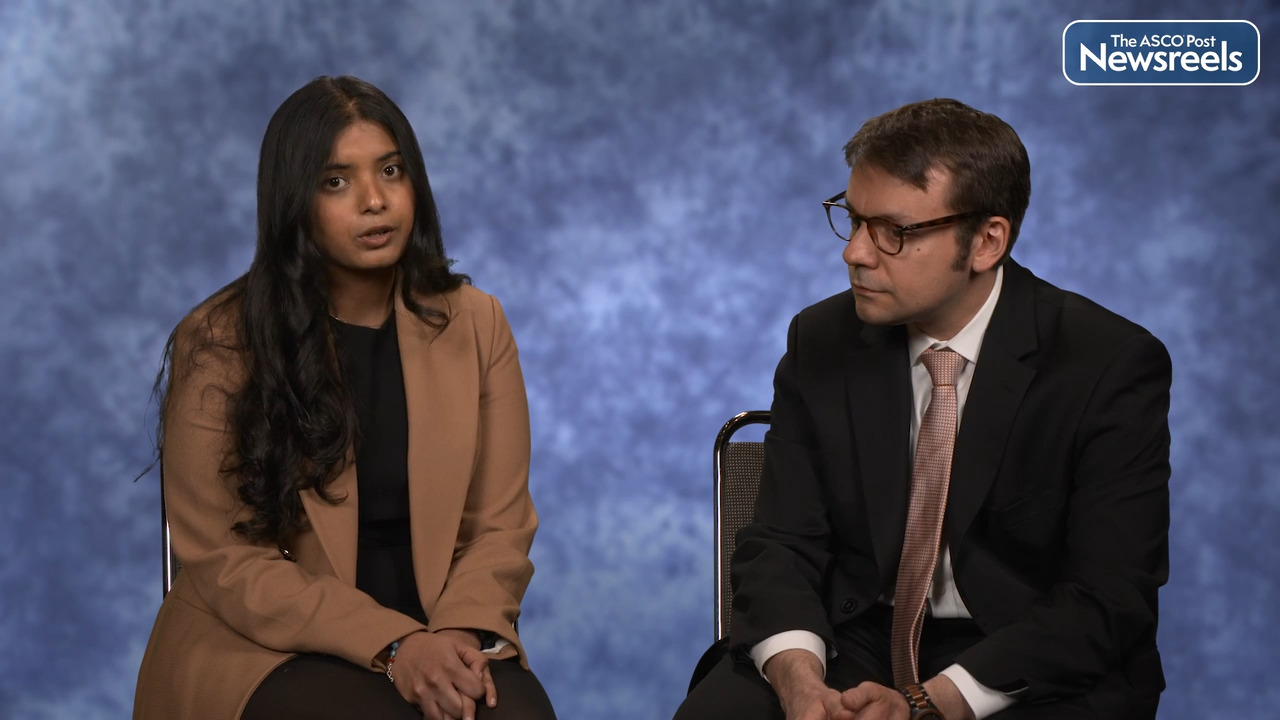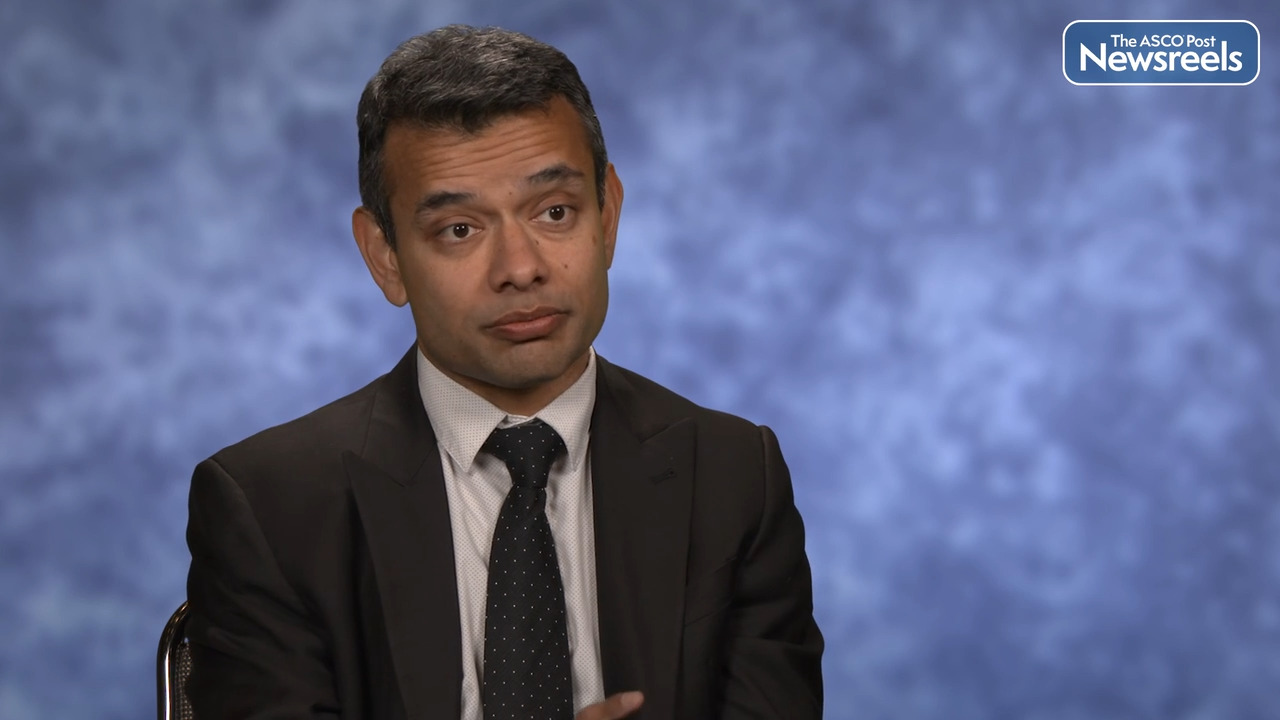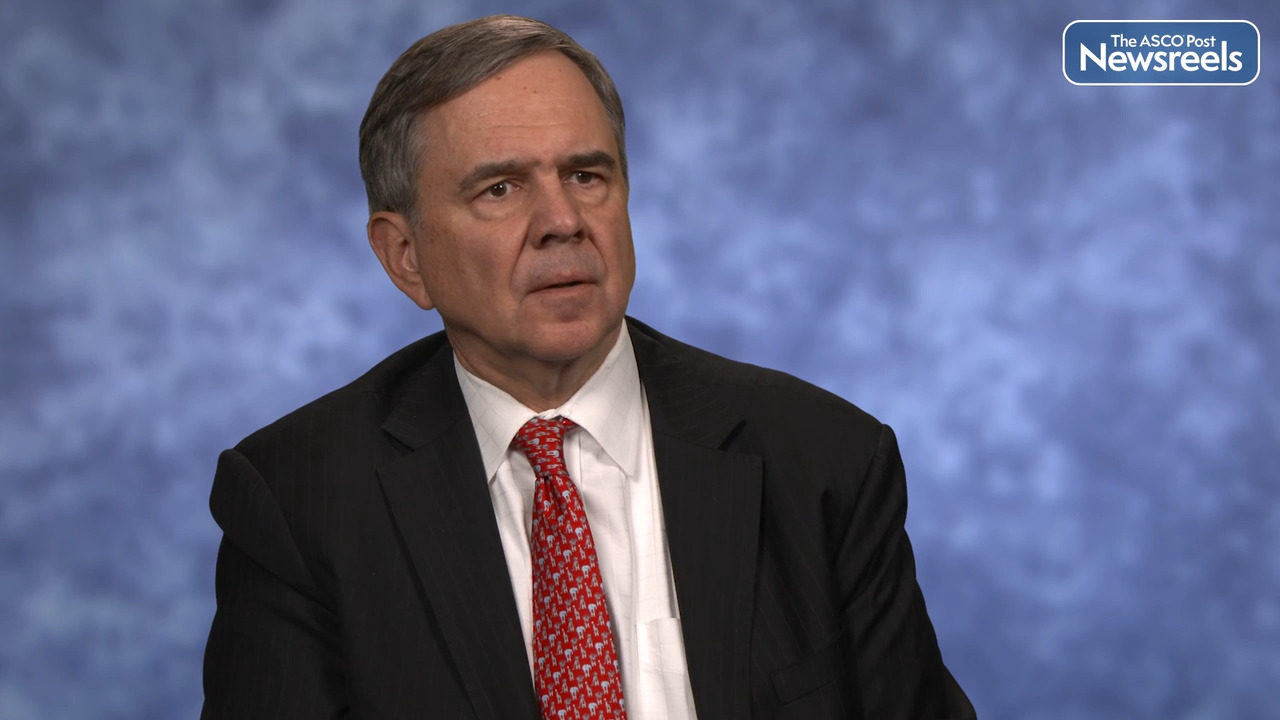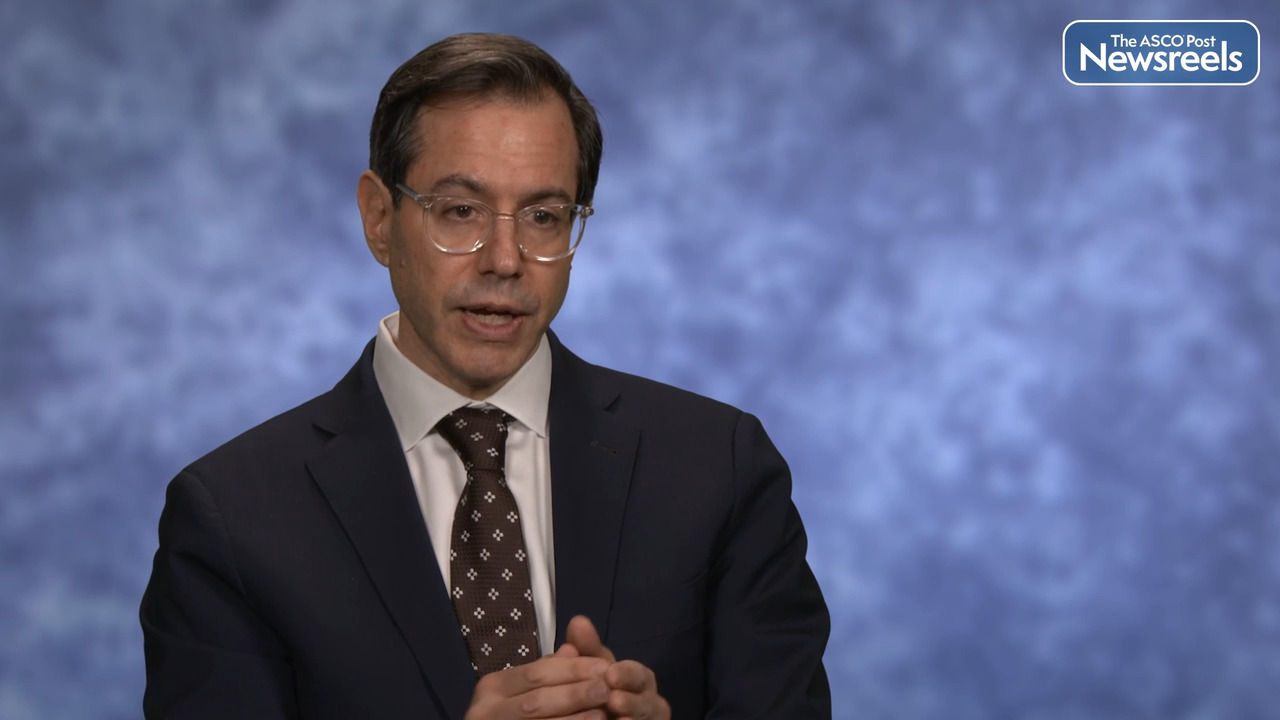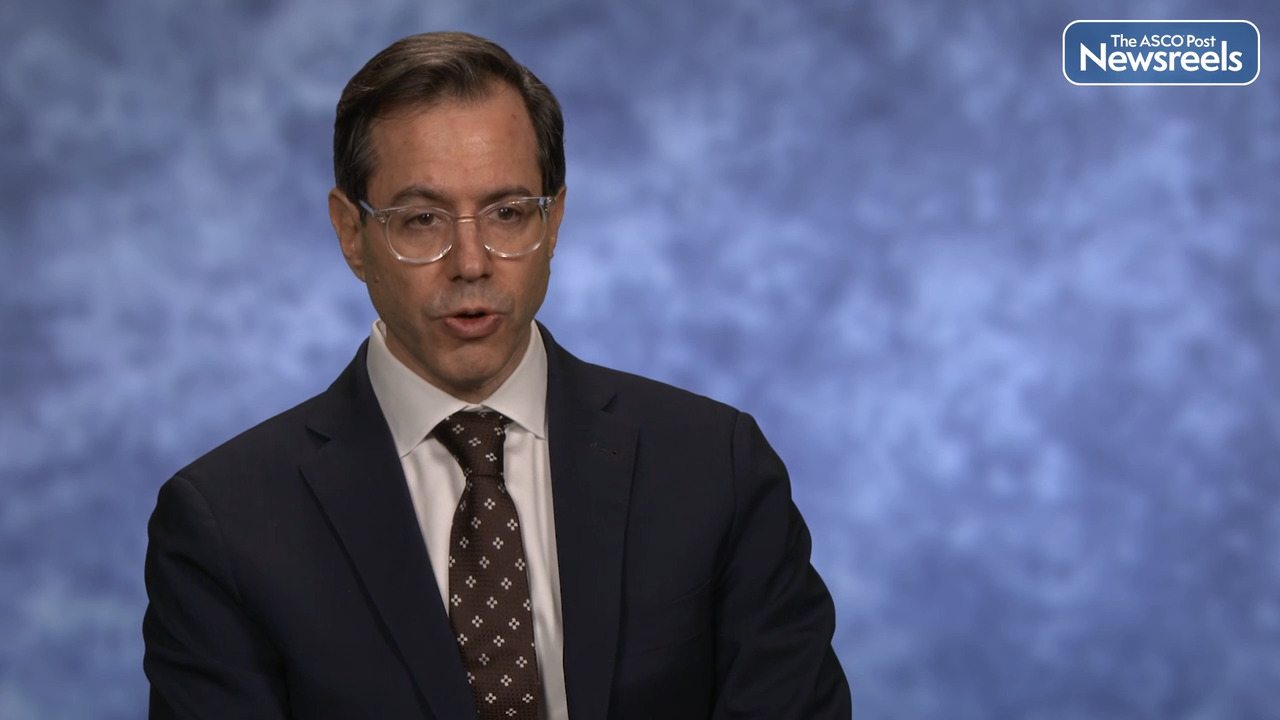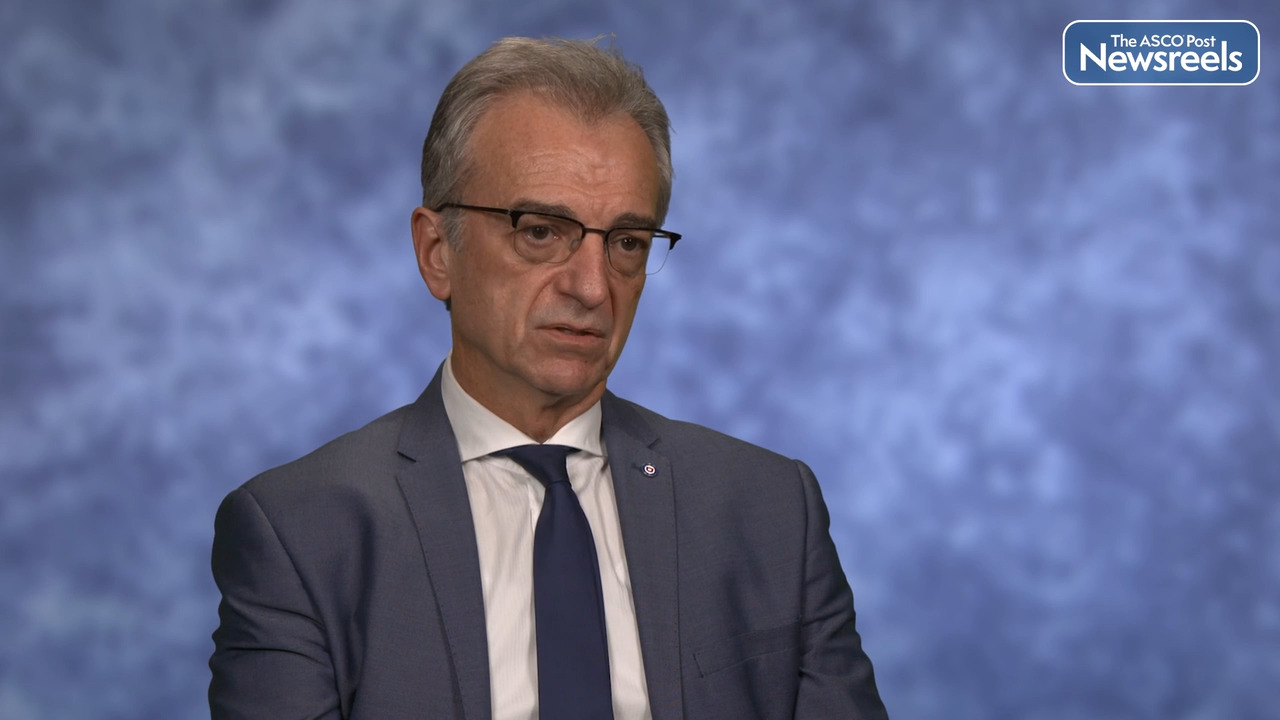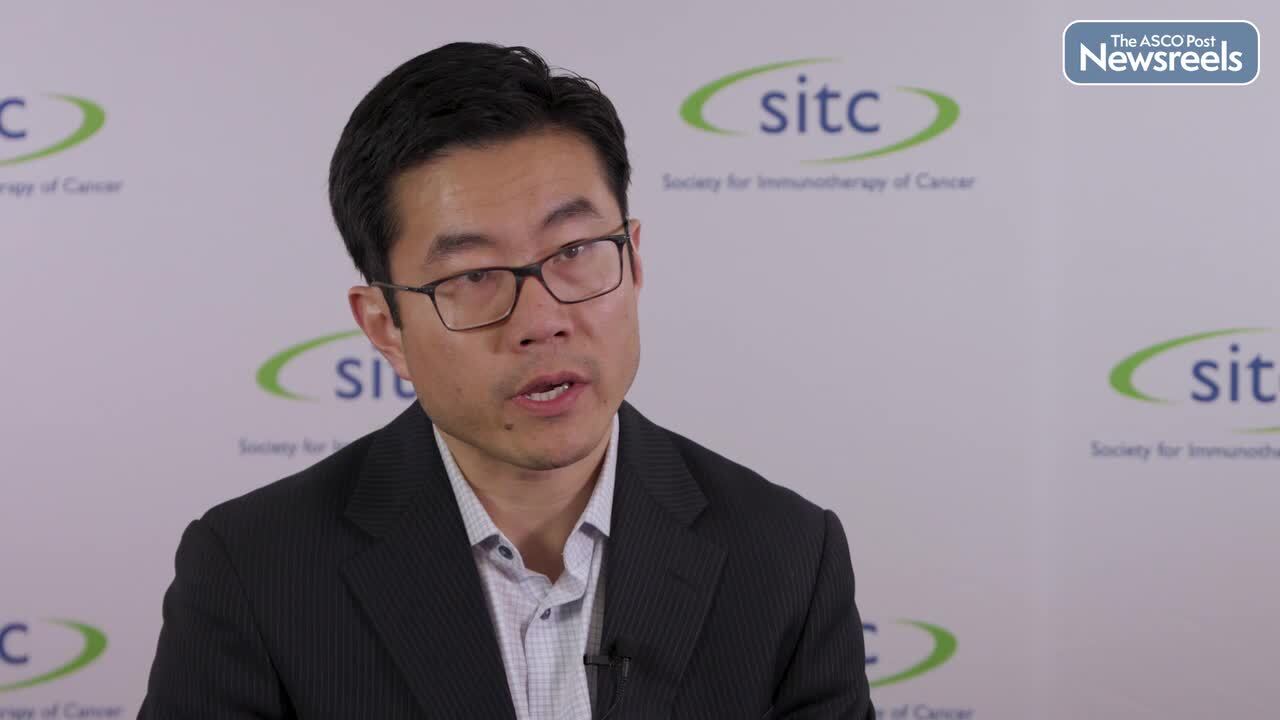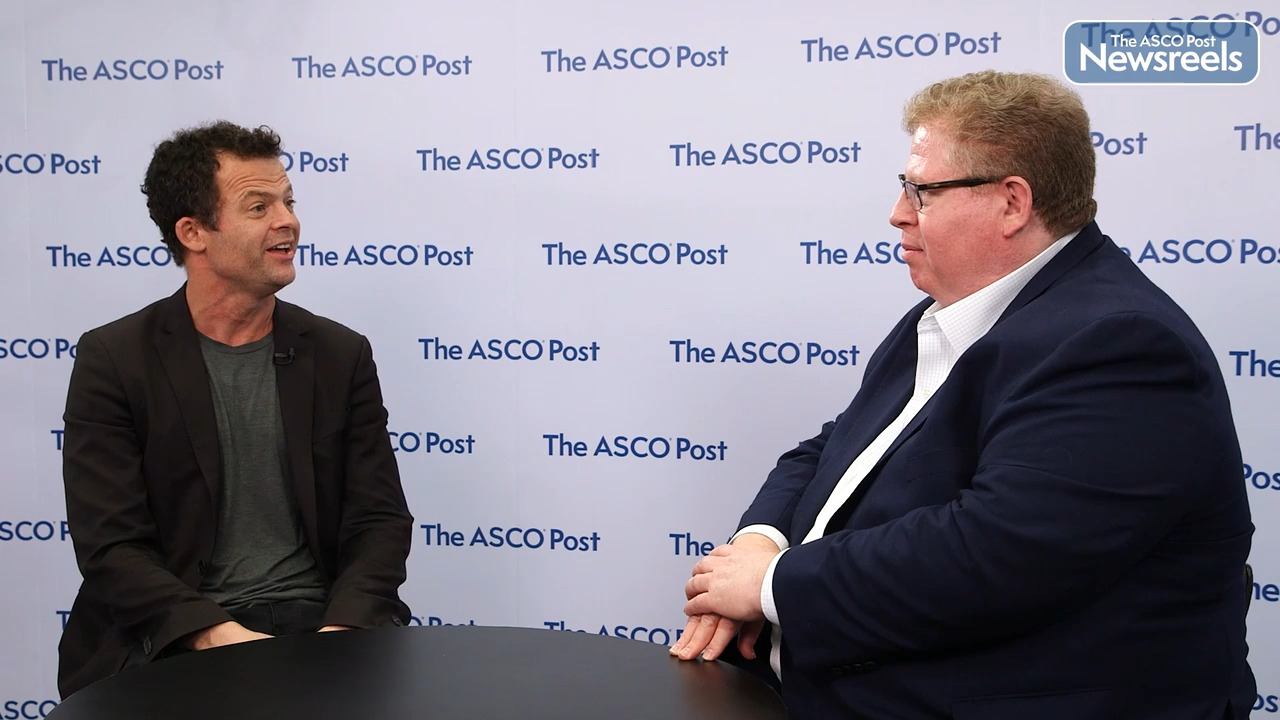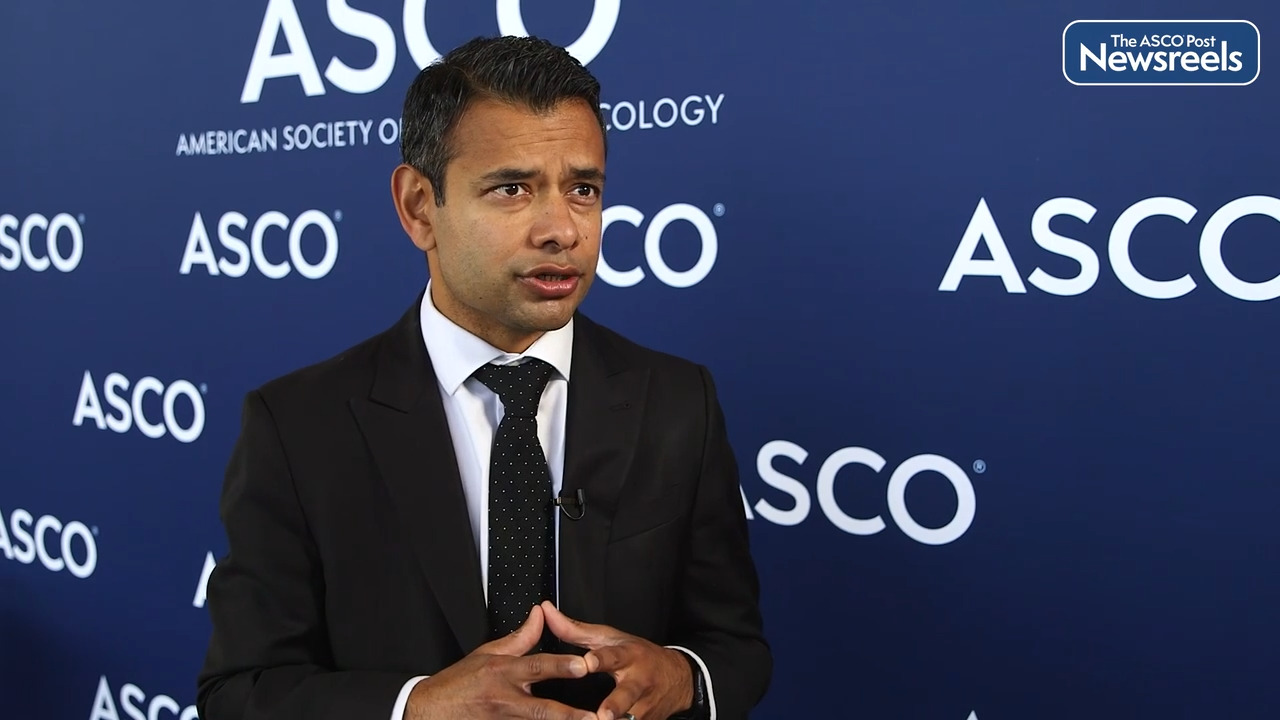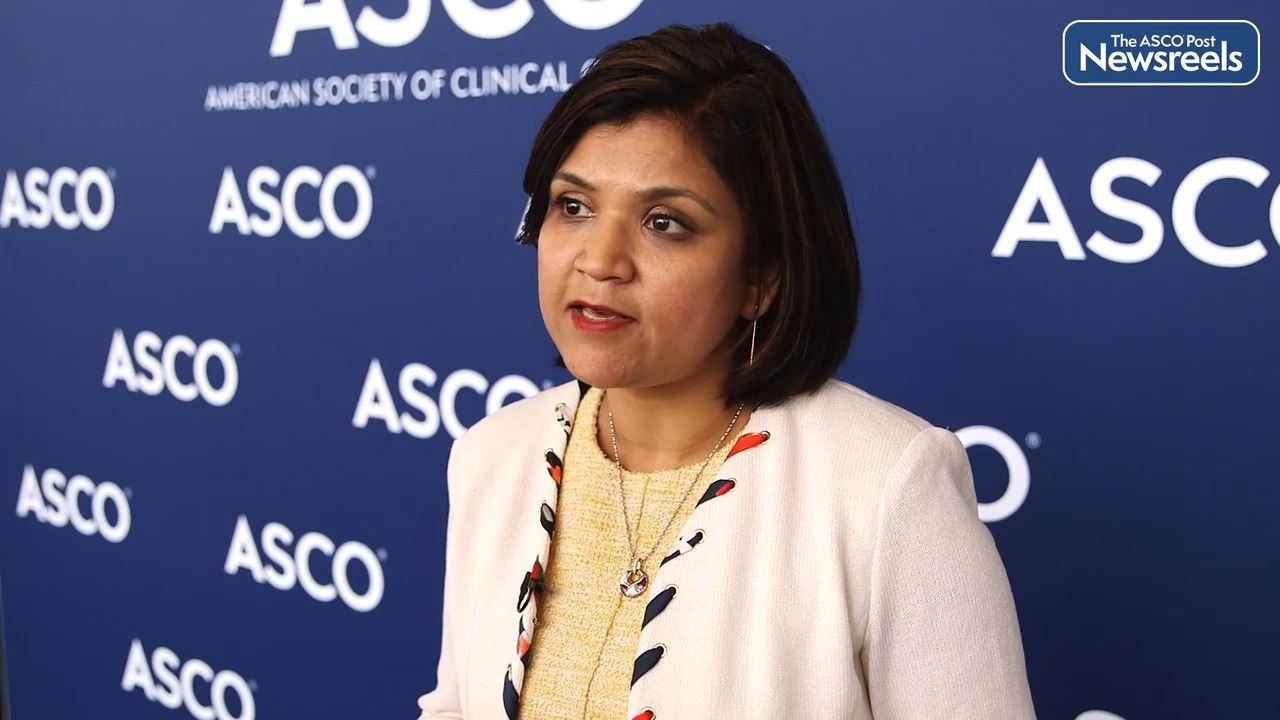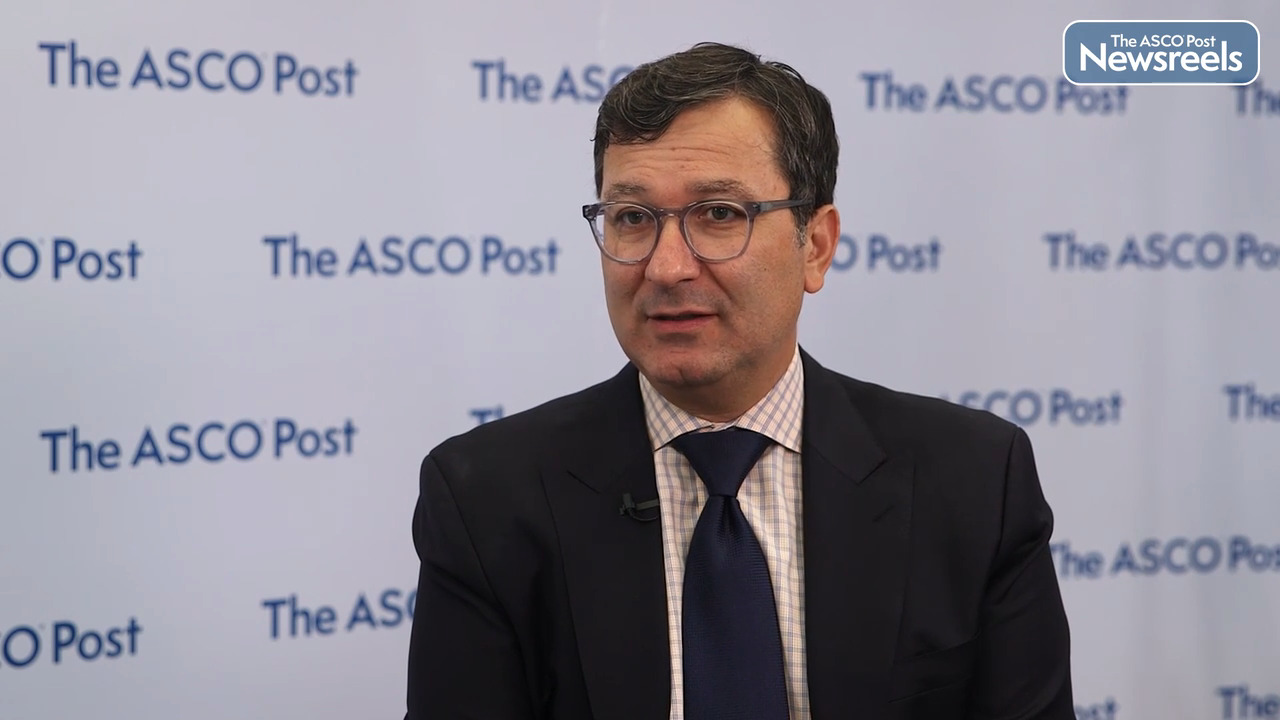Novel Device May Be Safe, Effective Chemotherapy Delivery System for Patients With Muscle-Invasive Bladder Cancer Who Are Unfit for Standard Therapy
Researchers have found that the novel intravesical chemotherapy delivery system TAR-200 may be safe and effective for patients with advanced muscle-invasive bladder cancer who are medically unfit for standard treatment, according to a new study published by Tyson et al in The Journal of Urology....
Arlene O. Siefker-Radtke, MD, on Urothelial Cancer: Emerging Therapies
Arlene O. Siefker-Radtke, MD, of The University of Texas MD Anderson Cancer Center, provides an overview of the emerging treatments for urothelial cancer, including several new agents in the antibody-drug conjugate and tyrosine kinase inhibitor classes. She describes the clinical activity and toxicities of enfortumab vedotin-ejfv, erdafitinib, and sacituzumab govitecan-hziy.
FDA Grants Accelerated Approval to Enfortumab Vedotin-ejfv/Pembrolizumab for Locally Advanced or Metastatic Urothelial Carcinoma
On April 3, the U.S. Food and Drug Administration (FDA) granted accelerated approval to the antibody-drug conjugate enfortumab vedotin-ejfv (Padcev) in combination with the PD-1 inhibitor pembrolizumab (Keytruda) for patients with locally advanced or metastatic urothelial carcinoma who are...
How Do Novel Genetic Subtypes of Urothelial Carcinoma Respond to Immune Checkpoint Blockade?
In a study reported in the Journal of Clinical Oncology, Sarfaty et al identified novel genetic subtypes of urothelial carcinoma exhibiting different responses to immune checkpoint blockade. Study Details In the multicenter study, whole-exome sequencing was performed on tumor specimens from 88...
Expert Point of View: Xin Gao, MD
Xin Gao, MD, Assistant Professor, Harvard Medical School, Genitourinary Cancers Program, Mass General Cancer Center, commented on the results from TROPHY-U-01 cohort 2. “These data add to the overall data on the efficacy of sacituzumab govitecan in patients with metastatic urothelial cancer. This...
Sacituzumab Govitecan-hziy Achieves Response After Disease Progression on Immune Checkpoint Inhibitor in Metastatic Urothelial Cancer
Treatment with the antibody-drug conjugate sacituzumab govitecan-hziy achieved an objective response rate of 32% in platinum-ineligible patients with metastatic urothelial cancer who experienced disease progression on an immune checkpoint inhibitor, according to the primary analysis of the...
AI-Based Model for Nodal Metastasis Detection Using Whole-Slide Images in Bladder Cancer
In a Chinese study reported in The Lancet Oncology, Wu et al found that an artificial intelligence (AI)-based lymph node metastases diagnostic model using whole-slide images performed well in identifying lymph node metastases in patients with bladder cancer, as well as other cancers. Study Details...
Novel Urine Test May Play a Role in Bladder Cancer Prediction
Testing for genetic mutations in urine may help clinicians detect bladder cancer years before the disease shows clinical symptoms, according to new findings presented by Le Calvez-Kelm et al at the 2023 European Association of Urology Annual Congress (Abstract A0268). The researchers identified...
Nivolumab Followed by Nivolumab/Ipilimumab Boosting in Nonresponders Among Previously Treated Patients With Advanced Urothelial Carcinoma
In a German-Austrian phase II study (TITAN-TCC) reported in The Lancet Oncology, Grimm et al found that a strategy of nivolumab monotherapy followed by immunotherapeutic boosting including high-dose ipilimumab in nivolumab nonresponders showed activity in patients with unresectable or metastatic...
CheckMate 274: Continued Disease-Free Survival Benefits With Adjuvant Nivolumab in High-Risk Urothelial Carcinoma
With longer-term follow-up, adjuvant nivolumab continued to demonstrate improved disease-free survival, non–urothelial tract recurrence–free survival, and distant metastasis–free survival vs placebo in patients with muscle-invasive urothelial carcinoma at high risk of recurrence after surgery,...
Vadim S. Koshkin, MD, and Tanya Jindal, BS, BA, on Urothelial Carcinoma: Biomarkers of Response to Enfortumab Vedotin-ejfv
Vadim S. Koshkin, MD, and Tanya Jindal, BS, BA, both of the University of California, San Francisco, Helen Diller Family Comprehensive Cancer Center, discuss results from the retrospective UNITE study of biomarkers of response to the antibody-drug conjugate enfortumab vedotin-ejfv in patients with advanced urothelial carcinoma. Enfortumab vedotin is used widely in treatment-refractory disease, but there have been limited data available on biomarkers that may predict outcomes with this treatment. The UNITE study has now identified several potential biomarkers that need to be validated to help inform clinical decision-making and therapy sequencing. (Abstract 450).
Updates From City of Hope on Renal Cell, Prostate, and Urothelial Cancers
Sumanta K. Pal, MD, introduces his City of Hope colleagues, Hedyeh Ebrahimi, MD, MPH, who discusses the prevalence of dietary modification and supplement use in patients with metastatic renal cell carcinoma, and Daniela Castro, MSc, who discusses expanding eligibility criteria in kidney, prostate, and urothelial cancer trials to more accurately reflect the real-world population and reducing exclusion criteria. (Abstract 662, 612, 34, 453)
Combination Chemotherapy May Be Safe and Effective Alternative for the Treatment of Patients With Non–Muscle-Invasive Bladder Cancer Amid BCG Shortage
Researchers have found that a safe, inexpensive chemotherapy combination may be better tolerated and more effective at preventing high-grade recurrence in patients with non–muscle-invasive bladder cancer than the standard-of-care bacillus Calmette-Guérin (BCG), according to a novel study published...
Daniel P. Petrylak, MD, on Urothelial Cancer: Phase II Trial Analysis of Sacituzumab Govitecan-hziy in Metastatic Disease
Daniel P. Petrylak, MD, of the Yale Cancer Center, discusses a primary phase II analysis of the TROPHY-U-01 study, cohort 2, which evaluated sacituzumab govitecan-hziy in platinum-ineligible patients with metastatic urothelial cancer that progressed after prior checkpoint inhibitor therapy. (Abstract 520).
Matt D. Galsky, MD, on Bladder or Upper Urinary Tract Cancer: Extended Follow-up Results From CheckMate 274
Matt D. Galsky, MD, of the Icahn School of Medicine at Mount Sinai and Tisch Cancer Institute, discusses results from CheckMate 274, which investigated nivolumab compared with placebo in patients with bladder or upper urinary tract cancer, following radical surgery to remove invasive disease. (Abstract LBA443).
Matt D. Galsky, MD, on Urothelial Carcinoma: New Study Results on Atezolizumab, Platinum, and Gemcitabine
Matt D. Galsky, MD, of the Icahn School of Medicine at Mount Sinai and Tisch Cancer Institute, discusses final overall survival data from the phase III IMvigor130 study, which compared atezolizumab versus placebo, both of which were paired with platinum and gemcitabine in the first-line treatment of patients with locally advanced or metastatic urothelial carcinoma. (Abstract LBA440).
Andrea Necchi, MD, on Bladder Cancer: Phase II Results With Pembrolizumab Monotherapy
Andrea Necchi, MD, of Italy’s Vita-Salute San Raffaele University and the IRCCS San Raffaele Hospital and Scientific Institute, discusses new data from the KEYNOTE-057 trial on a novel systemic therapy for papillary high-risk non–muscle-invasive bladder cancer. The findings suggest that patients whose disease does not respond to bacillus Calmette-Guérin or who declined or were ineligible for a radical cystectomy may benefit from pembrolizumab monotherapy. (Abstract LBA442).
Aristotelis Bamias, MD, on Urothelial Carcinoma: Final Overall Survival Analysis of Atezolizumab Monotherapy vs Chemotherapy
Aristotelis Bamias, MD, of the National and Kapodistrian University of Athens, discusses results from the phase III IMvigor130 study, which suggest that atezolizumab monotherapy continues to show better tolerability vs chemotherapy for patients with untreated locally advanced or metastatic urothelial carcinoma. (Abstract LBA441).
Nivolumab After Surgical Resection Improves Disease-Free Survival for Patients With High-Risk Muscle-Invasive Urothelial Carcinoma
Adjuvant therapy with the immune checkpoint inhibitor nivolumab following surgery improved disease-free survival in patients with high-risk muscle-invasive urothelial carcinoma, according to new findings presented by Matthew D. Galsky, MD, FASCO, and colleagues at the 2023 ASCO Genitourinary...
Single-Arm Phase II Noninferiority Trial Evaluates Active Surveillance vs Cystectomy Following Neoadjuvant Chemotherapy for Muscle-Invasive Urothelial Carcinoma
Researchers have found that following chemotherapy, 46% of patients with muscle-invasive urothelial carcinoma were able to avoid a cystectomy and achieve a 2-year metastasis-free survival, according to new findings presented by Daniel M. Geynisman, MD, and colleagues at the 2023 ASCO Genitourinary...
First Adenoviral Vector–Based Gene Therapy for High-Risk BCG-Unresponsive Non–Muscle-Invasive Bladder Cancer
On December 16, 2022, nadofaragene firadenovec-vncg, an adenoviral vector–based gene therapy, was approved for patients with high-risk bacillus Calmette-Guérin (BCG)-unresponsive non–muscle-invasive bladder cancer with carcinoma in situ with or without papillary tumors.1 Supporting Efficacy Data...
Study Reports Activity With Oncolytic Vaccine Plus Pembrolizumab in BCG-Unresponsive Bladder Cancer
An oncolytic therapy delivered within the urinary bladder in combination with pembrolizumab has yielded high complete response rates in patients with bacillus Calmette-Guérin (BCG)-unresponsive bladder cancer, according to data presented by Roger Li, MD, lead study investigator and urologic...
Neoadjuvant Gemcitabine/Cisplatin in High-Risk Upper Tract Urothelial Carcinoma
In a phase II trial reported in the Journal of Clinical Oncology, Coleman et al found that neoadjuvant split-dose gemcitabine and cisplatin produced a high rate of pathologic response in patients with high-risk localized upper tract urothelial carcinoma. The investigators also showed that...
Mitomycin Gel for Upper Tract Urothelial Cancers: Postmarket Analysis
Researchers have performed the first postmarkert analysis of a novel delivery system of mitomycin—a gel formation, also known as UGN-101—to treat upper tract urothelial cancers, according to a novel study published by Woldu et al in Urologic Oncology. Their findings showcase how the treatment is...
Study Examines Genitourinary Cancer Trends, Disparities in the United States
New findings revealed that the highest mortality rates for prostate cancer among White male patients were found in the Western United States—including California—despite low incidence rates, according to a new study published by Schafer et al in European Urology. However, when compared with White...
FDA Approves First Gene Therapy for High-Risk Non–Muscle-Invasive Bladder Cancer
On December 16, the U.S. Food and Drug Administration (FDA) approved nadofaragene firadenovec-vncg (Adstiladrin), a nonreplicating adenoviral vector–based gene therapy indicated for the treatment of adult patients with high-risk bacillus Calmette-Guérin (BCG)-unresponsive non–muscle-invasive...
Study Reports Activity With Oncolytic Vaccine Plus Pembrolizumab in BCG-Unresponsive Bladder Cancer
An oncolytic therapy delivered within the urinary bladder in combination with pembrolizumab has yielded the “best results seen in the field” in patients with bacillus Calmette-Guérin (BCG)-unresponsive bladder cancer, according to data presented during the 2022 Society for Immunotherapy of Cancer...
DNA Repair Protein MRE11 Expression and Disease-Specific Mortality Among Patients With Muscle-Invasive Bladder Cancer Receiving Trimodality Therapy
In a retrospective analysis reported in JAMA Network Open, Magliocco et al found that among patients with muscle-invasive bladder cancer receiving bladder-preserving trimodality therapy, those with a lower expression of the DNA repair protein MRE11 had significantly poorer disease-specific...
Roger Li, MD, on Bladder Cancer: Boosting Immune Checkpoint Blockade With an Oncolytic Adenovirus
Roger Li, MD, of the H. Lee Moffitt Cancer Center, discusses results from a phase II single-arm study of CG0070, a cancer-selective oncolytic adenovirus that creates mechanistic synergy with immune checkpoint blockade. In this trial, the virus was combined with pembrolizumab in patients with non–muscle-invasive bladder cancer that is unresponsive to bacillus Calmette-Guérin. At 3 months, 88% of the 35 patients enrolled achieved a complete response (Abstract 666).
Jonathan E. Rosenberg, MD, on Urothelial Cancer: Results From EV-103, Cohort K on Enfortumab Vedotin and Pembrolizumab
Jonathan E. Rosenberg, MD, of Memorial Sloan Kettering Cancer Center, discusses recent findings on the safety and antitumor activity of enfortumab vedotin-ejfv given intravenously as monotherapy or in combination with pembrolizumab to previously untreated cisplatin-ineligible patients with locally advanced or metastatic urothelial cancer (Abstract LBA73).
Rogaratinib vs Chemotherapy in Previously Treated Patients With Advanced Urothelial Carcinoma and FGFR1/3 mRNA Overexpression
As reported in the Journal of Clinical Oncology by Cora N. Sternberg, MD, and colleagues, interim analysis of the phase II portion of the phase II/III FORT-1 trial has shown similar objective response rates with the oral FGFR1–4 inhibitor rogaratinib vs chemotherapy in previously treated patients...
Intensive Chemoresection With Mitomycin to Reduce the Need for Surgical Procedures in Patients With Recurrent Non–Muscle-Invasive Bladder Cancer
In a Danish study (DaBlaCa-13) reported in the Journal of Clinical Oncology, Lindgren et al found that short-term intensive chemoresection with mitomycin reduced the need for surgical procedures in patients with recurrent non–muscle-invasive bladder cancer. Study Details The trial was conducted at...
Enfortumab Vedotin-ejfv Plus Pembrolizumab in Cisplatin-Ineligible Patients With Advanced Urothelial Cancer
In a phase Ib/II study reported in the Journal of Clinical Oncology, Christopher J. Hoimes, MD, and colleagues found that first-line enfortumab vedotin-ejfv plus pembrolizumab produced a high response rate and prolonged response durations in cisplatin-ineligible, previously untreated patients with...
New Research From Cohort K of the EV-103 Trial of Enfortumab Vedotin for Patients With Urothelial Cancer
Researchers from Memorial Sloan Kettering (MSK) Cancer Center shared data on a treatment option for patients with bladder cancer at the European Society for Medical Oncology (ESMO) Congress 2022 (Abstract LBA73). Jonathan E. Rosenberg, MD, medical oncologist and Chief of the Genitourinary Oncology...
Novel Pembrolizumab-Based Combination Under Study in Metastatic Urothelial Carcinoma
In a phase II trial reported in the Journal of Clinical Oncology, Sadeghi et al found that EphrinB2 inhibition with soluble EphB4-human serum albumin (sEphB4-HSA) plus pembrolizumab appeared to exert substantial activity in patients with metastatic urothelial carcinoma, particularly among patients...
Rucaparib Maintenance After Platinum-Based Chemotherapy for Metastatic Urothelial Carcinoma
In a phase II trial reported in the Journal of Clinical Oncology, Simon J. Crabb, BSc, MBBS, MRCP, PhD, and colleagues found that maintenance therapy with the poly (ADP-ribose) polymerase (PARP) inhibitor rucaparib vs placebo was associated with prolonged progression-free survival in patients with...
Genetics May Predict Bladder Cancer Immunotherapy Response
Investigators have identified genetic signatures that could predict whether tumors in patients with bladder and other cancers will respond to immunotherapy with immune checkpoint inhibitors. Their findings, published by You et al in the Journal of the National Cancer Institute, implicate DDR1- and...
EAU22: ctDNA May Help to Predict Response to Atezolizumab in Patients With Bladder Cancer
Researchers who treated a group of patients with bladder cancer with the immunotherapy atezolizumab after they had undergone surgery have found that patients whose blood contained circulating tumor DNA (ctDNA) responded very well to the treatment. The study was presented at the European Association ...
Addition of Olaparib to Durvalumab in Previously Untreated, Platinum-Ineligible Patients With Metastatic Urothelial Carcinoma
As reported in the Journal of Clinical Oncology by Jonathan E. Rosenberg, MD, and colleagues, the phase II BAYOU trial has shown no improvement in progression-free survival with the addition of the poly (ADP-ribose) polymerase (PARP) inhibitor olaparib to the anti–PD-L1 agent durvalumab in...
Expert Point of View: Guru P. Sonpavde, MD
Guru P. Sonpavde, MD, Director of the Bladder Cancer Program at Dana-Farber Cancer Institute and a faculty member of Harvard Medical School, Boston, said these follow-up data from CheckMate 274 provide reassurance that the disease-free survival benefit is maintained with adjuvant nivolumab. “We...
CheckMate 274: Adjuvant Immunotherapy Improves Disease-Free Survival in Metastatic Urothelial Cancer
Adjuvant nivolumab could become the standard of care for patients with metastatic bladder cancer, according to data presented at the American Urological Association (AUA) 2022 Annual Meeting.1 With longer follow-up, the results of the phase III CheckMate 274 trial showed that treatment with the...
Real-World Uptake of FGFR-Alteration Testing and Gene-Targeted Therapy for Patients With Urothelial Cancer
In a study reported in a research letter in JAMA Oncology, Nimgaonkar et al found that less than half of patients with urothelial cancer who had received first-line platinum-based therapy underwent testing for FGFR alterations and that less than half of patients with susceptible alterations...
Robotic Surgery Improves Perioperative Outcomes vs Open Radical Cystectomy in Bladder Cancer Trial
Patients who underwent robotic-assisted radical cystectomy with intracorporeal diversion spent fewer days in the hospital and experienced fewer complications compared with those who underwent open radical cystectomy, according to data presented at the 2022 American Urological Association (AUA)...
Thomas Powles, MD, PhD, and Jonathan E. Rosenberg, MD, on Urothelial Carcinoma: Long-Term Outcomes With Enfortumab Vedotin-ejfv vs Chemotherapy
Thomas Powles, MD, PhD, of Barts Health NHS Trust, Queen Mary University of London, and Jonathan E. Rosenberg, MD, of Memorial Sloan Kettering Cancer Center, discuss the 24-month findings from the phase III EV-301 trial, which suggest that enfortumab vedotin-ejfv continues to show a significant and consistent survival advantage over standard chemotherapy in patients with previously treated advanced urothelial carcinoma (Abstract 4516).
Sumanta K. Pal, MD, on Urothelial Carcinoma: New Results on Cabozantinib Plus Atezolizumab
Sumanta K. Pal, MD, of City of Hope National Medical Center, discusses findings from the COSMIC-021 study, which showed that cabozantinib plus atezolizumab demonstrated encouraging clinical activity with manageable toxicity in patients with inoperable locally advanced or metastatic urothelial carcinoma. The combination was administered as first-line therapy in cisplatin-based chemotherapy–eligible and –ineligible patients and as second- or later-line treatment in those who received prior immune checkpoint inhibitors (Abstract 4504).
Shilpa Gupta, MD, on Urothelial Cancer: Defining Who Is 'Platinum-Ineligible'
Shilpa Gupta, MD, of the Cleveland Clinic Foundation, discusses an updated consensus definition for standard therapy and clinical trial eligibility for patients with metastatic urothelial cancer who are platinum-ineligible, criteria that are proposed to guide treatment recommendations for this population. This may be especially important now that the U.S. Food and Drug Administration has restricted the use of first-line pembrolizumab to those who are considered platinum-ineligible (Abstract 4577).
Karim Chamie, MD, on Bladder Cancer: Final Results on N-803 and Bacillus Calmette-Guérin
Karim Chamie, MD, of the University of California, Los Angeles, discusses final clinical results on combining the superagonist N-803 with bacillus Calmette-Guérin (BCG) in patients whose carcinoma in situ and high-grade non–muscle-invasive bladder cancers are unresponsive to BCG alone. Of note, cystectomy was avoided in more than 90% of patients with 2 years of follow-up (Abstract 4508).
Postoperative Outcomes With Robot-Assisted vs Open Radical Cystectomy for Bladder Cancer
As reported in JAMA by Catto et al, the phase III iROC trial showed that robot-assisted radical cystectomy with intracorporeal urinary diversion resulted in better 90-day outcomes compared with open radical cystectomy in patients with bladder cancer. Study Details In the multicenter trial, 338...
Longer Follow-up Shows Adjuvant Immunotherapy After Bladder Cancer Surgery May Be Associated With Reduced Disease Recurrence
Treatment with the anti–PD-1 therapy nivolumab after surgery helped reduce cancer recurrence in patients with urothelial cancer of the bladder or other sites in the urinary tract that had invaded the muscle and therefore posed a high risk for recurrence, according to clinical trial results...
Report Finds Uptake of Erdafitinib for Urothelial Cancer May Be Limited, Despite Positive Real-World Survival Data
The first bladder cancer drug targeting a cancer-driving gene mutation has been used relatively little despite its clear efficacy in a clinical trial, suggests a report published as a research letter by Nimgaonkar et al in JAMA Oncology. Researchers analyzed a large, nationwide database of cancer...

